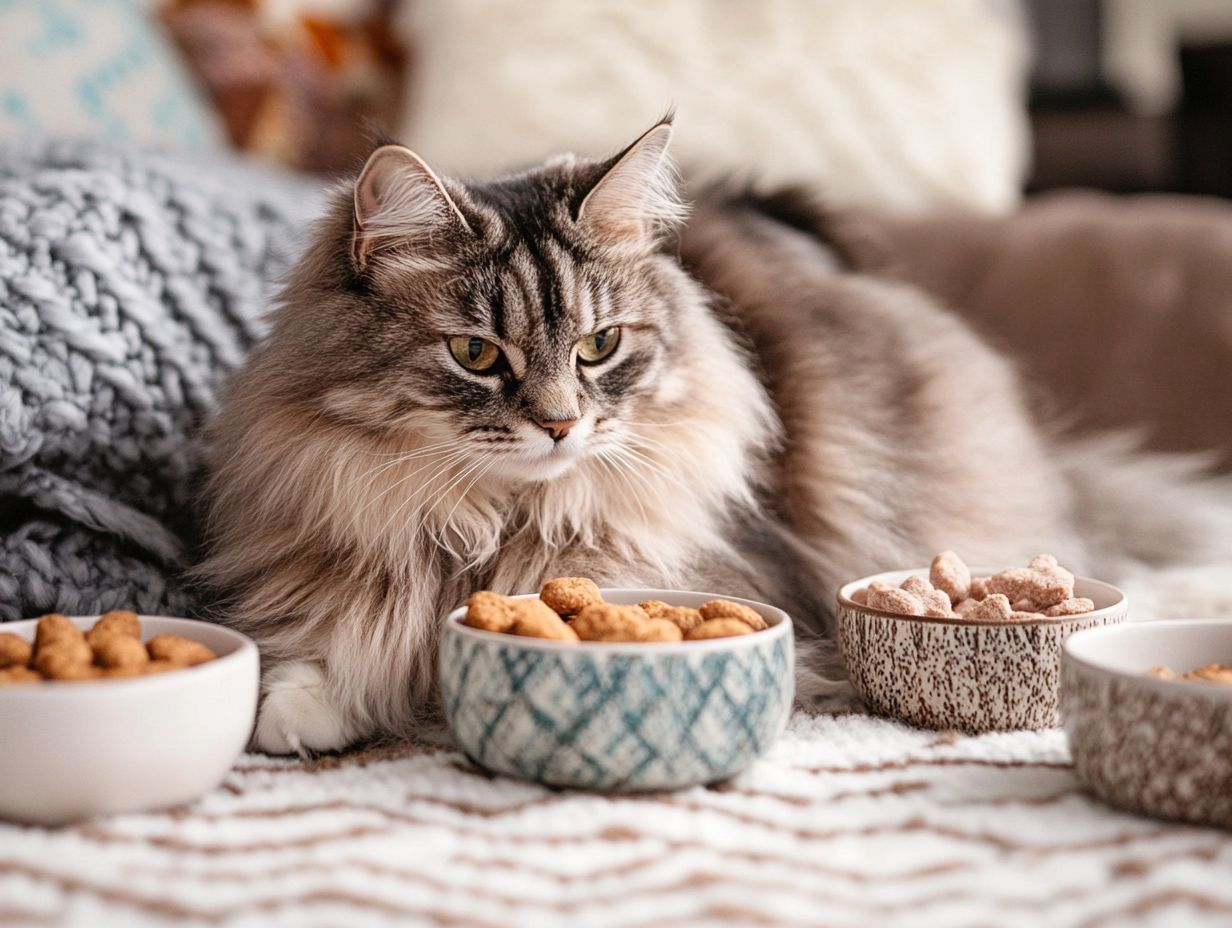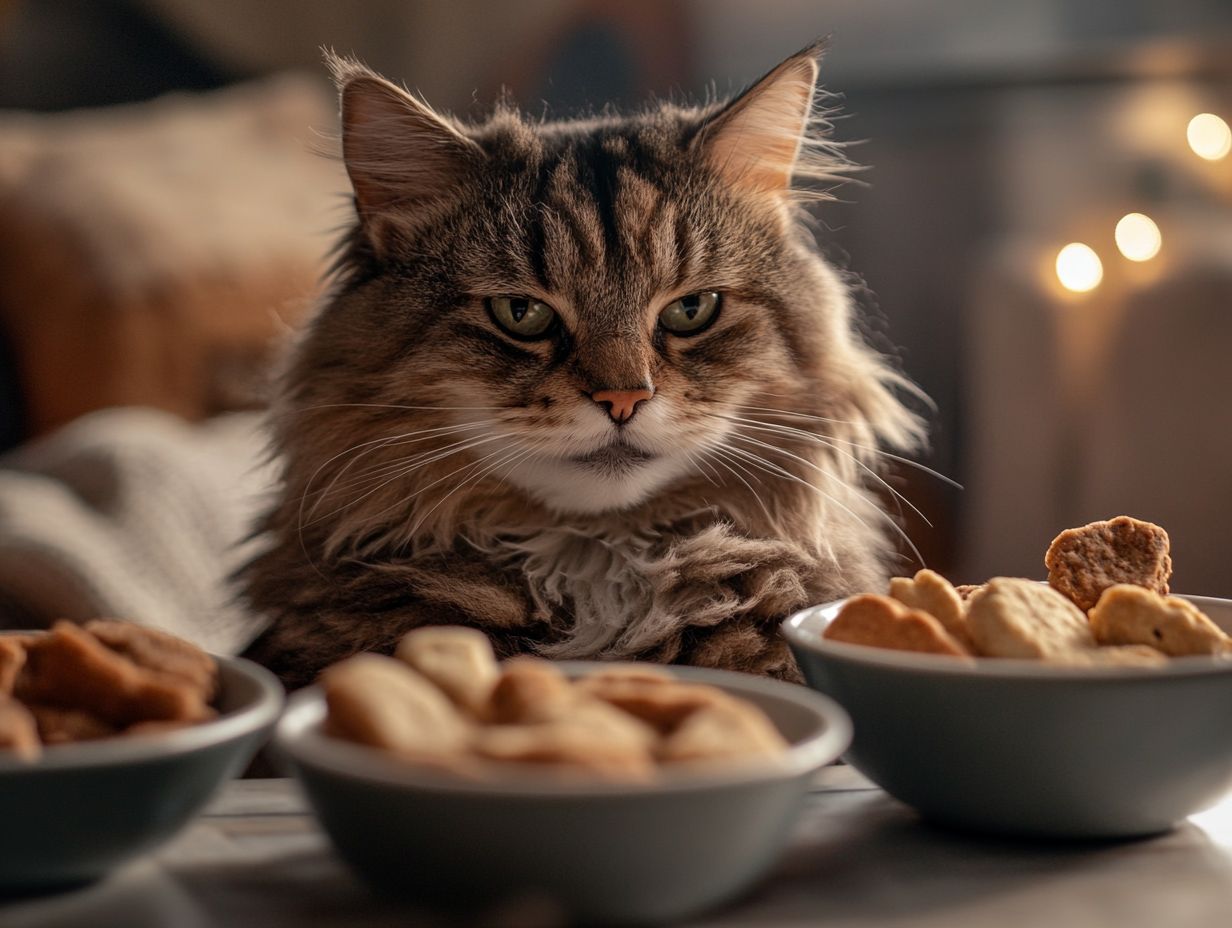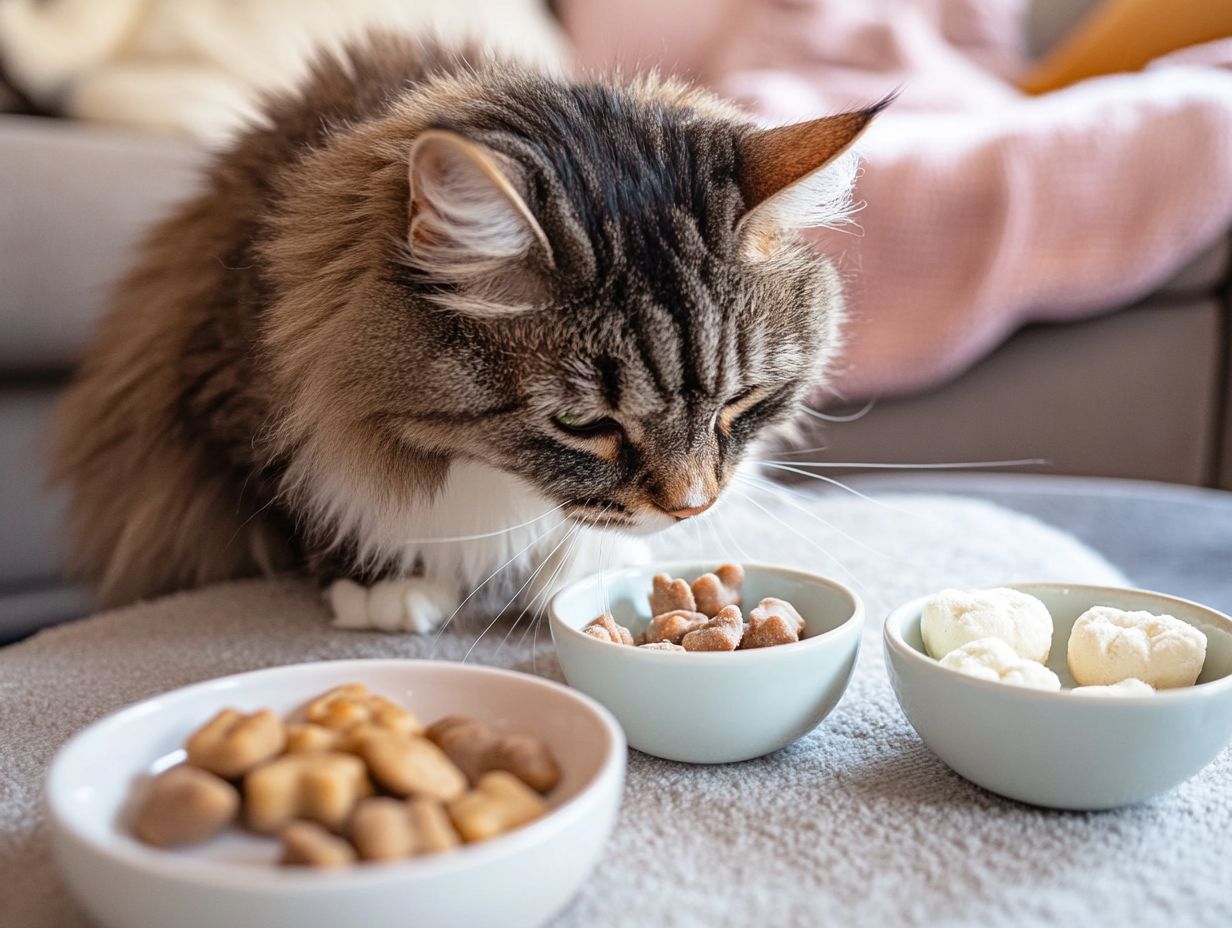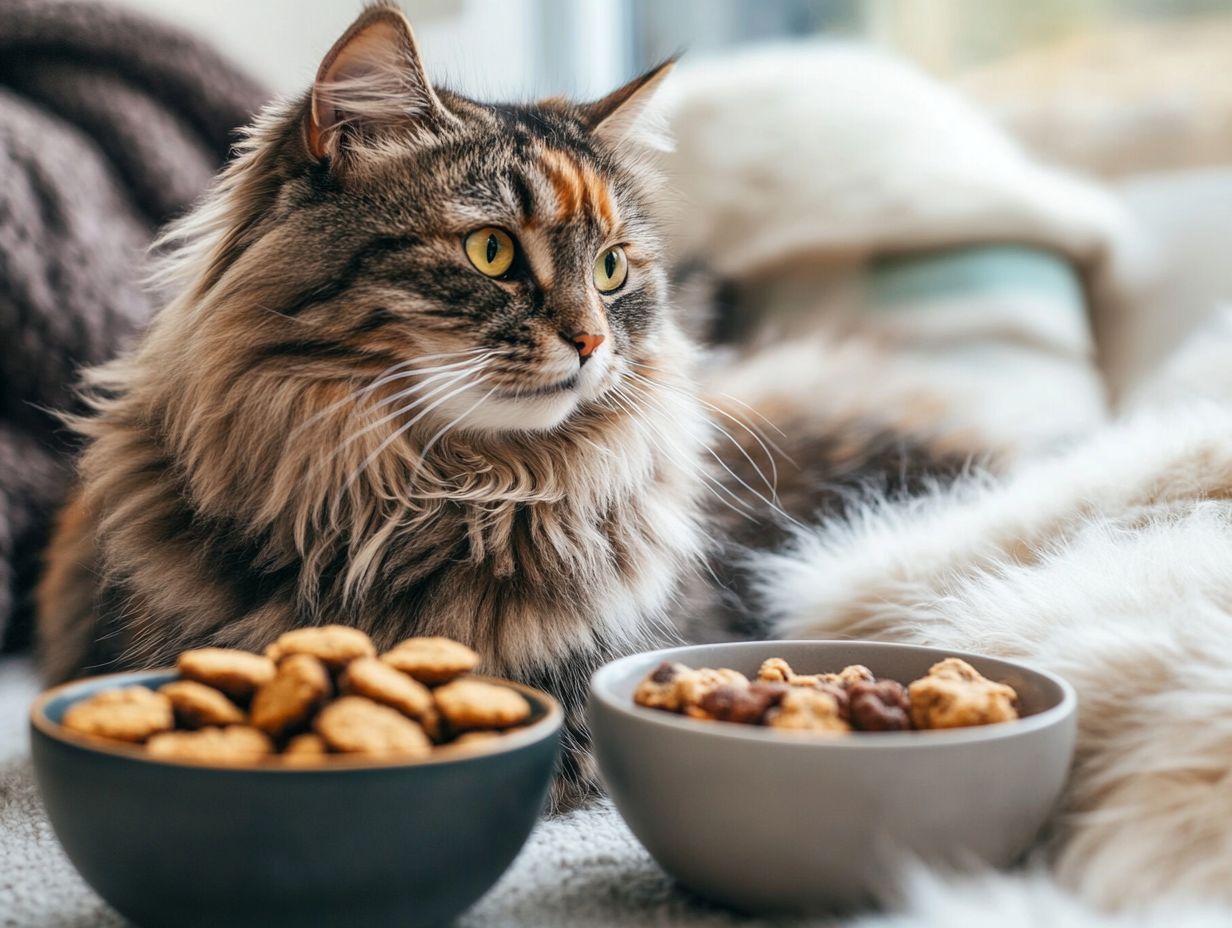As our feline friends age, their needs change, and understanding how to care for senior cats becomes essential. Experts emphasize the importance of nutrition and veterinary care for these pets. It is crucial to consult a veterinarian before making significant changes to a senior cat’s diet, especially if they have existing health issues.
From recognizing the signs of aging to addressing common health concerns like arthritis, diabetes, and kidney disease, this guide covers it all, incorporating advice from the Association of Pet Obesity Prevention and veterinary nutritionists. Particular attention should be paid to dietary needs such as reduced protein and phosphorus levels for kidney health, as well as moisture-rich foods to ensure adequate hydration.
Explore the best treats tailored for their unique nutritional requirements, ensuring they enjoy every bite while maintaining their health. Treats should be given in moderation to prevent obesity and maintain a balanced diet. Look for treats that include high-quality proteins such as chicken or fish, and avoid those with artificial additives, as recommended by AAFCO standards.
Learn how to choose the right treats to keep your senior cat happy and thriving in their golden years. Ensure that any treats align with their obligate carnivore nature and contribute positively to their health.
Key Takeaways:

- As cats age, they may experience signs of aging such as decreased activity and changes in behavior.
- Arthritis, dental disease, kidney disease, and hyperthyroidism are common health concerns for senior cats that can be alleviated with the right diet and treats.
- The best treats for senior cats are soft, moisture-rich, contain added nutrients, promote dental and joint health, and help with hairball control. It is important to choose treats tailored to their specific health needs, with ingredients that meet AAFCO standards, and without artificial additives.
- Be cautious of potential allergens in treat ingredients and consult your veterinarian to ensure safety.
What Are Senior Cats?
Senior cats are defined as felines that have reached an advanced age, typically around 7 years or older. They require specialized care to address their unique health needs, which may include managing obesity, making dietary adjustments, and ensuring increased hydration. Personal care and regular veterinary visits are also crucial for maintaining their quality of life.
Understanding the specific requirements of senior cats is essential for maintaining their quality of life and preventing common age-related health issues such as diabetes, chronic kidney disease, and arthritis. Experts emphasize the importance of proper nutrition, including moisture-rich foods, and regular veterinary check-ups to ensure that these cherished pets receive the affection and care they deserve in their golden years. Veterinary nutritionists and organizations like the American Association of Feline Practitioners provide valuable guidance.
What Are The Signs Of Aging In Cats?
As cats age, they exhibit various signs that signal changes in their behavior, health, and overall well-being. These signs may include decreased activity levels, alterations in appetite, and changes in grooming habits. Such shifts can lead to noticeable variations in energy; a once-playful cat might now prefer lounging in sunny spots instead of chasing after toys.
Weight fluctuations are also common; some cats may lose weight due to a reduced appetite or dental issues, while others may gain weight if their diets remain unchanged despite a more sedentary lifestyle. Hydration becomes particularly important during this stage, as older cats are more susceptible to dehydration. It is essential for cat owners to closely monitor these changes, as a balanced diet and proper hydration—such as providing wet food or water fountains—can greatly enhance their overall health and comfort in their senior years.
What Are The Common Health Concerns For Senior Cats?
Obesity, diabetes, chronic kidney disease, and arthritis are common health issues in senior cats that can significantly impact their quality of life.
1. Arthritis
Arthritis is a common ailment in older cats, characterized by joint inflammation that causes pain and decreased mobility, severely impairing the quality of life for affected felines.
The etiology of this condition is complex and includes factors such as age-related degeneration of joints, obesity, and genetic predisposition. Symptoms often manifest as stiffness, reluctance to jump or play, and behavioral changes, including reduced grooming or increased irritability.
Managing arthritis involves exploring treatment options such as anti-inflammatory medications, joint supplements, and physical therapy tailored to feline needs. Maintaining joint health is essential, as a balanced diet rich in essential nutrients and moderate exercise can significantly improve mobility and reduce pain in these otherwise loving and lively pets.
2. Dental Disease
Monitoring dental health in senior cats is crucial, as dental disease can lead to further health complications. Regular dental check-ups and appropriate treats that promote oral hygiene are essential for preventing tartar buildup and maintaining healthy gums.
It is important to store cat food properly to prevent spoilage and maintain nutritional integrity. Signs of spoiled food include an off smell, discoloration, or a change in texture.
Disclaimer: Always consult your veterinarian before providing any additional supplements, as there are risks of toxicity or imbalances.
Dental disease is a common issue among senior cats that can lead to serious health complications if left untreated. Therefore, regular dental check-ups and proper oral hygiene are essential for their well-being. While dental treats can assist in maintaining oral health, it is important to note that they do not replace the need for professional dental care.
As these feline companions age, their susceptibility to oral infections increases, which can negatively impact not only their teeth and gums but also their overall health, potentially leading to systemic conditions such as heart disease or kidney damage. Owners should prioritize regular veterinary visits that include dental assessments to identify any issues early on.
Incorporating a balanced diet rich in nutrients and dental-friendly ingredients can significantly help in preventing plaque buildup. Routine check-ups, practices such as brushing their teeth, and providing dental treats can aid in maintaining their oral health.
3. Kidney Disease

Chronic kidney disease (CKD) is a common and serious condition in older cats, characterized by early symptoms that may be non-specific but can quickly lead to severe illness if not managed properly. As cats age, their kidneys may lose functionality, resulting in a range of concerning symptoms, including increased thirst, increased urination, and weight loss. The causes of CKD are complex and may include genetics, diet, and other underlying medical conditions.
Managing this condition often necessitates dietary adjustments and should always be guided by a veterinarian. Ensuring that cats with CKD drink plenty of water is crucial for flushing toxins out of their bodies, so owners should encourage their pets to stay well-hydrated. Additionally, a low-protein and low-phosphorus diet may be necessary to alleviate strain on the kidneys; however, it is important to consult with a veterinarian for individualized dietary recommendations. For more information on healthy treats, check out the Top Treats for Senior Cats: Keeping Them Healthy.
Regular veterinary check-ups are essential for cats with CKD, as the disease is progressive and will require adjustments to the treatment plan over time. Frequent visits to the veterinarian can significantly improve the quality of life for these patients.
4. Hyperthyroidism
Hyperthyroidism is a common endocrine disorder in elderly cats characterized by an overproduction of thyroid hormone. This excess hormone leads to an increased metabolism and a range of other health complications.
Diagnosis typically involves blood tests to measure thyroid hormone levels, and veterinarians may also employ imaging techniques to evaluate the thyroid glands. Treatment options can vary based on the severity of the condition and may include medication, dietary changes, or surgery. Regular veterinary visits are essential for monitoring any changes in hormone levels and ensuring that these senior animals maintain a good quality of life.
Hyperthyroidism presents with various symptoms, including increased appetite, weight loss, excessive grooming, and hyperactivity. As the metabolism accelerates, affected felines may also experience behavioral changes and increased thirst, contributing to their stress.
What Are The Best Treats For Senior Cats?
The best treats for senior cats are nutritious and flavorful, tailored to meet their specific health needs. These treats should be high in moisture, enriched with additional nutrients, and supportive of dental health.
1. Soft, Moist Treats
Soft, moisture-rich treats are ideal for senior cats, as they are easier to chew and digest. This makes them a preferred option for pets with dental issues or decreased appetite.
These treats enhance the eating experience for aging felines and positively contribute to their overall well-being. The moisture content in these snacks promotes better hydration, which is essential for kidney health and helps prevent urinary tract issues.
Additionally, their gentle texture can stimulate the appetite even in cats that may have lost interest in food, encouraging regular and nutritious intake. When selecting soft treats, it is crucial to verify their quality, ensuring they are made from natural ingredients free of artificial additives. Signs of spoilage to look out for include unusual odors, changes in color, or texture.
This approach safeguards their health while enhancing their enjoyment during snack time.
2. Treats With Added Nutrients
When considering treats with added nutrients, it is essential to choose options that are specifically designed for senior cats. While some protein is essential, low-protein diets may be necessary for CKD management, and high-quality animal protein should be prioritized. Always consult with a veterinarian for guidance on the best options.
As you explore treat options, also consider the ethical and sustainability aspects of your choices, keeping the health and nutritional needs of senior cats as a priority.
Treats enriched with added nutrients can significantly benefit senior cats by providing essential vitamins and minerals that support their overall health and well-being. In particular, these enhanced treats often contain high levels of omega-3 fatty acids, which promote joint health and reduce inflammation, making movement easier for aging cats. It is important to verify these claims with current veterinary research or guidelines from recognized bodies like AAFCO or WSAVA.
Additionally, fiber-rich ingredients help ensure digestive health, which is crucial for seniors who may experience gastrointestinal issues. Antioxidants play a vital role in counteracting the effects of aging, allowing cats to maintain their vitality and boost immunity during their later years. However, pet owners should remember that treats should not replace a balanced diet and should consult with a veterinarian about their cat’s specific dietary needs, especially for seniors with health issues.
Pet owners should carefully read labels, as not all products offer the same benefits; knowing the ingredient list is essential to ensure that the nutritional needs of senior felines are adequately met. It is vital to ensure that glucosamine and other beneficial compounds come from high-quality sources, such as reputable brands that are known for their quality ingredients.
3. Dental Health Treats
Specially designed dental health treats for senior cats can significantly aid in maintaining oral hygiene and reducing the risk of dental diseases, which are common in older felines. These treats often contain beneficial ingredients such as green tea extract and specific enzymes that target plaque and tartar buildup, promoting a cleaner mouth and better overall health. However, it is crucial to clarify potential risks associated with these treats, such as choking hazards or inappropriate ingredients that may not be suitable for certain health conditions.
Brands like Hill’s Prescription Diet and Temptations provide a variety of options that not only appeal to senior cats with their flavors but also actively contribute to improved gum health. Regular use of these treats not only results in fresher breath but also helps prevent conditions like periodontal disease, making them an essential part of a senior cat’s daily routine and diet.
By incorporating dental treats into their diet, pet owners can ensure their feline companions enjoy a healthier and happier life, reducing risks associated with aging.
4. Joint Health Treats

Joint health treats that contain glucosamine and other beneficial compounds can significantly support mobility and joint function in senior cats, which is crucial for their overall quality of life. As cats age, maintaining their flexibility and comfort becomes increasingly essential; therefore, pet owners should prioritize dietary choices that enhance joint health and well-being.
Treats specifically formulated with ingredients such as chondroitin, omega-3 fatty acids, and antioxidants play a vital role in reducing inflammation and promoting cartilage repair. When selecting products for their feline companions, it is important for caregivers to read labels carefully, ensuring they choose high-quality sources of these nutrients to avoid obesity.
By providing these specialized treats, caregivers can help ensure that their senior cats lead active and fulfilling lives, making every moment spent together even more precious.
5. Hairball Control Treats
Hairball control treats for cats are essential for older felines, as they tend to be more susceptible to hairballs due to changes in their grooming habits. As cats age, their grooming routines often result in increased fur consumption, which can accumulate in their digestive systems, impacting digestion.
These specialized treats contain healthy ingredients, such as fiber and natural herbs, that aid in moving hair through the digestive tract more efficiently. However, it is important to emphasize that a well-balanced diet in conjunction with treats is crucial for managing hairballs effectively, rather than implying that treats are a standalone solution. By minimizing the formation of hairballs, these treats support overall digestibility and reduce the risk of serious health issues, such as gastrointestinal blockage and obesity prevention.
How To Choose The Right Treats For Senior Cats?
When selecting treats for senior cats, it is important to consider their health needs, dietary requirements, and overall nutrition. Ensure that the treats contain high-quality ingredients and are free from artificial additives, promoting safety and nutrition.
1. Consider Their Health Needs
Choosing treats for senior cats can be challenging due to their specific health needs, including dietary restrictions, hydration requirements, and existing health conditions. Recognizing that each senior cat is unique allows us to address the distinct challenges that arise in each case. Factors such as chronic kidney health, dental health, and weight must be carefully assessed. Additionally, it is essential to discuss how certain ingredients in treats may interact with prescription medications, emphasizing the need for veterinary consultation before introducing new treats into a cat’s diet.
Additionally, senior cats may experience changes in their metabolic rates, which can affect how treats impact their overall health. To navigate this issue effectively, communication with veterinary professionals is essential, as they possess the clinical expertise and nutritional knowledge needed to evaluate health status and provide recommendations. Consulting a veterinary nutritionist can also provide valuable insights.
This guidance helps cat owners select treats that will best support their pets’ well-being and health, ensuring care and proper nutrition.
2. Look For High-Quality Ingredients
Choosing treats made with quality ingredients is crucial for the health of senior cats, as these treats provide essential nutrients without harmful substances. With many options available, discerning pet owners should prioritize food safety and make it a point to read labels to identify beneficial elements and avoid fillers and artificial additives.
Treats that list real meat, such as chicken or salmon, as one of the first ingredients are particularly beneficial, as they offer essential proteins necessary for maintaining muscle mass. Additionally, ingredients like sweet potatoes and pumpkin contribute fiber that supports digestive health, while omega-3 fatty acids from fish oil promote healthy skin and coat. Ensuring these treats meet AAFCO standards can further guarantee their nutritional adequacy, which is vital for senior cats.
Understanding these positive factors can significantly enhance the well-being of senior cats, promoting a balanced diet and nutrition. For more information, check out Top Treats for Senior Cats: Keeping Them Healthy.
3. Avoid Treats With Artificial Additives
Avoiding treats with artificial additives is crucial for the health and safety of senior cats, as these ingredients can lead to various health issues and negatively affect their quality of life. Encouraging natural alternatives promotes overall care.
Such additives, often used to enhance flavor and preserve freshness, may upset their digestive systems or result in long-term complications like obesity or allergies. Ingredients like certain grains or fillers can contribute to these conditions, leading to weight gain or adverse reactions. By choosing natural alternatives, pet owners not only protect their cats but also promote their overall vitality and energy.
Nutritional treats made from healthy ingredients support stable energy levels, maintain an ideal weight, and improve fur quality—factors that are essential for aging cats. Engaging in regular exercise can further enhance these benefits.
Focusing on natural options fosters a nurturing environment in which senior cats can thrive, ultimately contributing to their well-being as they age and enhancing their personal care.
4. Check For Treats Specifically Made For Senior Cats

Treats specifically designed for senior cats are essential because they cater to the unique nutritional needs of older felines, such as weight management and joint health. They also support kidney and liver function, preventing hepatic lipidosis.
These treats often contain ingredients that support mobility and cognitive function, which are vital for maintaining a vibrant quality of life. Consequently, senior cat treats are formulated with the necessary protein, vitamins, and nutrients, distinguishing them from regular treats that often provide only empty calories. This helps manage appetite and promote well-being.
Additionally, most of these treats are made to be softer and easier to chew, which is beneficial for cats with dental issues. Proper storage practices for cat treats are essential to prevent spoilage and contamination; look for signs of spoilage such as an off smell or discoloration. Ultimately, choosing the right treats can contribute to better health and happiness for our companions, enhancing their overall well-being as they age. Consulting with a veterinarian can provide guidance on veterinary care and transition needs.
Frequently Asked Questions
What are the top treats for senior cats?
The top treats for senior cats include those that are specifically formulated for their age and health needs, such as treats with added joint support or dental benefits. Brands like RAWZ and Daily Paws offer excellent options.
Why is it important to choose the right treats for senior cats?
Choosing appropriate treats is crucial for maintaining the health and nutritional needs of senior cats, ensuring they receive the necessary support for their unique dietary requirements.
As cats age, their nutritional needs change, requiring a diet higher in animal-source protein and potentially lower in phosphorus to support kidney health. Specialized treats can help keep senior cats healthy and happy, encouraging affection and a deeper bond.
Are there any treats that should be avoided for senior cats?
Yes, treats that are high in fat, calories, or carbohydrates should be avoided for senior cats, as they can contribute to weight gain and other health issues. Opting for low-calorie, high-protein, and moisture-rich foods can help maintain a healthy weight.
Can senior cats safely eat the same treats as younger cats?
While some treats may be suitable for cats of all ages, it’s important to consult with your veterinarian to ensure that the treats are appropriate for your senior cat’s individual needs, considering factors like chronic kidney disease or the need for omega-3 fatty acids for joint health.
What are some signs that a senior cat may benefit from specialized treats?
Some signs that a senior cat may benefit from specialized treats include difficulty chewing, joint stiffness, and dental issues. Consult with your veterinarian or a veterinary nutritionist for recommendations, particularly for treats designed to support dental health.
How often should treats be given to senior cats?
Treats should be given in moderation and should not exceed 10% of a cat’s daily caloric intake, which may vary significantly based on your cat’s health status and activity level. Consult with your veterinarian or refer to guidelines from the American Association of Feline Practitioners for specific recommendations based on your senior cat’s health needs.